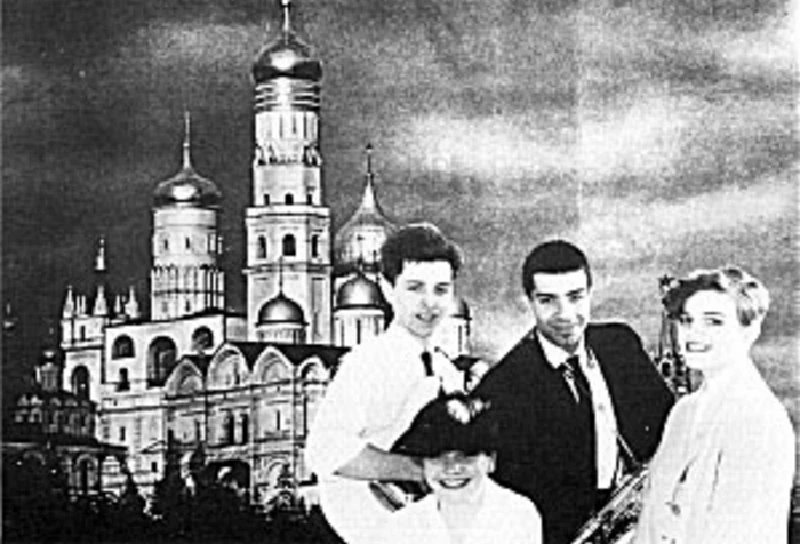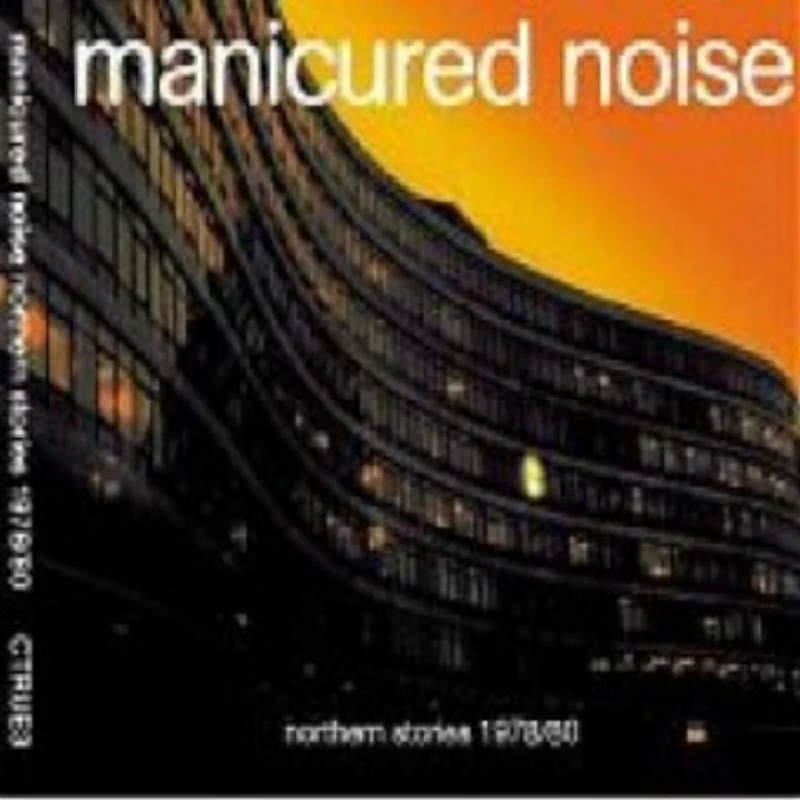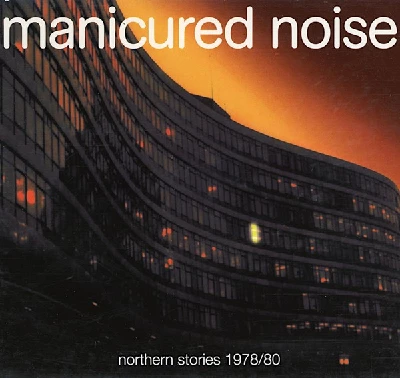Manicured Noise - Interview
by Mark Rowland
published: 7 / 1 / 2007

intro
One of the lost great post punk acts of the late 70's, Manchester-based band Manicured Noise have recently had all their recordings put together on a compilation 'Northern Stories 78/80'. Guitarist and latter singer Steve Walsh talks to Mark Rowland about the revival of his group
Great bands come and go. Some last decades, some last one album and are remembered for long time afterwards. But others end up as a footnote on rock’s back pages, largely forgotten by the general public. As the interest in the late-70's post-punk era grew, however, some lost bands have been remembered, as labels seek out old post-punk bands and re-release their old recordings. Manicured Noise were mentioned very, very briefly in Simon Reynolds’post-punk history ‘Rip it Up and Start Again’. They were, however, a great band, at their peak a kind of English fusion of Talking Heads and the Contortions. Unfortunately, their career was effectively over before it began, with only a couple of EPs under their belt. The band was quickly working towards their peak after their original vocalist Owen Gavin left the group, shifting from an abstract, avant-garde sound to something more accessible. Now, all their studio recordings, plus a BBC session and some live tracks, have been compiled on ‘Northern Stories 78/80’, on Caroline True records. It includes two versions of the band’s best known track, ‘Faith’, which was covered by indie band Shack in the late 80's. The album was put together almost accidentally, when music writer Jon Savage phoned guitarist and later front man Steve Walsh out of the blue. “He was putting together a compilation for Caroline True records and wanted to put a Manicured Noise track on it,” says Walsh, speaking from his London home. “I said yes, of course, and he gave me the number of the label so I could talk to them about it. It turned out the owners of Caroline True were big Manicured Noise fans, and we started talking about doing a full Manicured Noise compilation album. “I’d had all this stuff lying around for years and it had never occurred to me that it could be released. When Manicured Noise were still together, we never got to a position where we could make an album. I never felt we were ready to make an album, to be honest. But the more we put it together it sounded much better than I thought it would sound.” Most of the tracks would even be unfamiliar to those that remembered them the first time around. Only the first few songs were ever released commercially, on a couple of seven inches. “Most people who know of the band are familiar with our song ‘Faith’. It’s probably our best known song. I was the first song I wrote once our first singer Gavin left. Other than that, I’m not sure how well known the other stuff is.” Walsh has little contact with the rest of the band, drummer Stephanie Nuttall, bassist Jodie Taylor, sax player Peter Bannister and original vocalist Owen Gavin, but has had some feedback from them on ‘Northern Stories’. “I got an e-mail from Pete the other day,” he says. “I hadn’t heard from him for years. I lost contact with the rest of the band, though I still know Stephanie a bit, because we both moved to London after Manicured Noise split up. Anyway, Pete and Jodie ended up getting married and they were told by their friends about the compilation, so they got hold of a copy. He told me that listening to the record was both really exciting and absolutely horrifying. It’s nice to know that they’ve heard it and thatm they approve of it.” Manicured Noise had been going for a while when Walsh joined the band. He had been a prominent figure on the London punk scene and had played guitar with Flowers of Romance, a vehicle for future members of the Banshees, and punk’s most infamous face, Sid Vicious. He also wrote articles for the UK music weeklies, and did the Sniffin’ Glue fanzine interview with the Clash which spurned the line "Like Trousers Like Brain." “I’d interviewed people like the Clash, the Subway Sect and the Pop Group, and I’d been a part of the scene down there,” he says. “I went up to Manchester to interview Manicured Noise, and, at the time, I was getting fed up of the London scene. I felt it was getting quite stale,and that there wasn’t as much creativity as there was before." “They had another guitarist when I went to interview them, and they weren’t very happy with him. They were going 'We don’t like him, he’s a w**ker' or whatever, although I thought he was alright. They knew I’d played guitar in the Flowers of Romance, so they said to me ’You play guitar. Why don’t you join us?’ I thought about it for a bit, then I came back up for an audition. I didn’t even have a guitar at the time, just an acoustic, so I had to borrow someone else’s, but we worked well together. I liked to play trebly, clean guitar, as far away from the kind of chunky sounds of the standard punk bands, which fit the music they were playing. So I got myself a Fender Mustang and joined them around September 1978.” The band started out as a very avant-garde band, playing tense, jazz and soundtrack-influenced instrumentals (largely because Gavin was a terrible singer). They were popular with some of the most respected bands of the time, aided partly by Walsh’s London scenester friends. Bands like Wire and the Pop Group name checked the band regularly, and they supported both bands, as well as Siouxsie and the Banshees and Alternative TV. Their approach to their music was that of the record appreciator - listening to lots of records and taking bits from each of them. “When we started, me and our first singer, Gavin, would write the songs together, and it was a totally different process to when it was me on my own,” says Walsh “We would sit down and listen to a record by, say, Chic,and we’d work out what we liked and take it in as part of our song. Then we’d listen to a film soundtrack, and take what we liked from that. So at the end we’d have an original composition made up of elements of other things. We certainly had a more avant-garde sound then, but as well as taking from avant-garde influences we were listening to quite cheesy things. We really liked the music from TV cop shows, for example, and Kung Fu movies, as well as disco music and stuff like that. Gavin brought a lot of ideas to the band, but he couldn’t really sing, which is a bit of a disadvantage as far as being a singer is concerned, so most of our early stuff is instrumental.” This approach was not to last. Gavin became more and more disinterested in practicing and playing with the band, even though he had a lot to do with the way the band worked. The members of the band got increasingly annoyed with him until he’d missed one too many shows. “He left because he was starting to miss practices and gigs, and people in the band were getting really fed up with him. It got to a point where there was a big bust up over something ridiculous, I think Gavin said something about Peter’s hat - he had this woolly hat that Gavin hated - and tensions were so high that things just blew up. It went on for ages, and some home truths were brought up. After that, we decided it was best that Gavin left.” Needless to say, Gavin was not best pleased with being ousted from "his" band. The band were preparing to record some material when Gavin threw a pretty large spanner into the works. “We had just signed to Pre and were getting ready to record an EP when Gavin left, and we were going to go ahead with the recording anyway,” says Walsh. “Then out of nowhere Gavin hired this solicitor who usually dealt with small cases, to stop us playing our old songs, claiming that they were his intellectual property, though he had co-written them with me. Somehow, this little solicitor in Manchester was running rings round the label’s legal team. It was unbelievable. So I had to come up with a whole new repertoire for us.” This was a difficult task, but the band came out of it very strongly. Previously, the band could never write a vocally-led song as Gavin was not a good enough singer. Walsh says that a lot of people around the time gave the band plenty of praise for their music, but often advised them to “Get a new singer”. "We were kind of liberated when Gavin left,” Walsh says. “Our sound became a bit more commercial after that. We were able to do some more song based stuff, though I never really got comfortable as a singer while I was in Manicured Noise. That’s part of the reason why I sound a bit like David Byrne. I was nervous as a singer so I ended up singing in this nervy, tense voice. I know I could never sing like that now. It’s exhausting being that tense.” The band released ‘Metronome’ and ‘Moscow 1980’ on seven inch single in 1979. Their first commercial release. ‘Faith’ followed soon afterwards. “Those recordings were meant to be demos,” says Walsh. “We didn’t record them in a proper studio. It was just so we could listen to them with the people from the label and decide which ones to record properly for the singles. But when we played them to the label, they wanted to release them. They were really happy with them. I really wasn’t keen on the idea of releasing the demos, but eventually they persuaded me to do it." Interest in the band was increasing at that time, and they recorded a session for Radio One DJ David "Kid" Jensen at the end of the year. Pop Group singer Mark Stewart was present at the recording, and provided backing vocals for the group. That session is included on ‘Northern Stories’. Despite things picking up for the band, Walsh was not completely happy with his life in the North. “I was miserable in Manchester,” he says. “Despite what I thought about the scene in London, I really missed it. Manchester was such a grey, cold, dreary city. It was depressing. My girlfriend still lived in London as well, so I hardly ever saw her, and I was constantly going backwards and forwards between the two cities.” The band were set to record their third EP in a proper studio for the first time at the beginning of 1980, but it wasn’t to be. Manicured Noise had slowly been pulling in different directions, as some members started to lose interest in music. “As we were getting ready to record the band sort of split in two. Our sax player Pete and our bassist Jodie were in a relationship, and they decided they were sick of playing music and wanted to settle down. Me and Stephanie tried to continue recording with me playing the bass, but it wasn’t really the same. Plus the studio was a real 70's studio, with this awful shag pile carpet, which kind of ruined the mood for the recording, so we were probably better off not recording in a studio anyway.” Walsh moved back to London with Nuttall in tow, and they tried to form another band. It didn’t really work out, but Walsh started a solo career which he carried on throughout the 80's, unfortunately never quite breaking into the mainstream. It has been a while since he released any solo material but is currently working on new music, influenced by South American folk. “I never quite went for a full on 80's sound at the time, so that probably has something to do with it. There was a time where I gave into pressure from the label and recorded some kind of slick 80's stuff, but it just didn’t sound right to me. It was too polished. It all kind of went a bit wrong in the 80's, because although there was some good stuff out there, a lot of the people who were doing something interesting and out there in the late 70's started doing the complete opposite. I think the lure of fame and money was too great for a lot of people - look at Green Gartside (of Scritti Politti), for example. I met him at a show once and my immediate thought was that he looked like a pop star, but when he started to make music it was this studious, squatter punk stuff. Then suddenly, he starts doing this really slick, polished pop music.” The music of the post-punk era had a lot to answer for in the coming decade, but it produced some of the most interesting music in pop’s history. The re-newed interest in 70s post-punk has not only introduced a new generation of music fans to bands like Pil, the Subway Sect, the Pop Group and the Slits. It has also revealed some of the great obscure bands that have laid hidden under rocks for the past twenty years. “Looking back, it was a really vibrant period to be in,” says Walsh of the late 70's. “But at the time it didn’t seem like it. Everything seemed stale to us. Nothing seemed to be going on, I guess that’s why so many great bands cropped up then. We felt like we had create something of substance ourselves.”
Picture Gallery:-

Visitor Comments:- |
| 258 Posted By: Juanculo, Miculo, Argentina on 14 Feb 2010 |
|
Yes, Luca Prodan continued in Argentina, you can find it in the local cementery of Avellaneda because he died in 1987 of cirrhosis.
|
| 99 Posted By: Matt, Buenos Aires, Argentina on 24 Dec 2007 |
|
Manicured Noise's drummer, Stephanie Nuttall, was invited in the early eighties to Argentina, to be the drummer at a new band that an italian friend of hers, Luca Prodan,was forming in the south-american country. So, she make the trip, and she was the first drummer of SUMO, maybe the greatest Argentinian band of all time, with a very talented italian ex-heroine addict frontman that most of the time sang in english, making music in styles like punk and reggae, nearly unknowns in that time and place. If you want to hear the girl, you will find her beating the drums in Sumo's first album, "Corpiños en la madrugada" ("Bras in the early morning") and in post-mortem demo compilation of Luca Prodan, "Time Fate Love".
She had to leave Argentine one and turn to londres after begun the Falkland's war in the '82, but Luca Prodan continued in Argetina with his Band (SUMO).
|
reviews |
|
Northern Stories 1978/80 (2006) |

|
| Compelling and creative free jazz-influenced post punk from 'lost' Manchester-based 70's group, Manicured Noise. |
most viewed articles
current edition
Carl Ewens - David Bowie 1964 to 1982 On Track: Every Album, Every SongBathers - Photoscapes 1
Armory Show - Interview with Richard Jobson
Colin Blunstone - Thalia Hall, Chicago, 16/7/2025
John McKay - Interview
Visor Fest - Valencia, Spain, 26/9/2025...27/9/2025
Billie Eilish - O2 Arena, London, 10/7/2025
Bathers - Photoscapes 2
Editorial - July 2025
Sir Tim Rice - Interview
previous editions
Heavenly - P.U.N.K. Girl EPOasis - Oasis, Earl's Court, London, 1995
Trudie Myerscough-Harris - Interview
Pixies - Ten Songs That Made Me Love...
Simon Heavisides - Destiny Stopped Screaming: The Life and Times of Adrian Borland
Beautiful South - Ten Songs That Made Me Love...
Prolapse - Interview
Blues and Gospel Train - Manchester, 7th May 1964
Boomtown Rats - Ten Songs That Made Me Love....
Fall - Hex Enduction Hour
most viewed reviews
current edition
Amy Macdonald - Is This What You've Been Waiting For?Sick Man of Europe - The Sick Man of Europe
Alice Cooper - The Revenge of Alice Cooper
Phew, Erika Kobayashi,, Dieter Moebius - Radium Girls
Lucy Spraggan - Other Sides of the Moon
Blueboy - 2
Cynthia Erivo - I Forgive You
Davey Woodward - Mumbo in the Jumbo
Lapsley - I'm a Hurricane, I'm a Woman In Love
Philip Jeays - Victoria
Pennyblackmusic Regular Contributors
Adrian Janes
Amanda J. Window
Andrew Twambley
Anthony Dhanendran
Benjamin Howarth
Cila Warncke
Daniel Cressey
Darren Aston
Dastardly
Dave Goodwin
Denzil Watson
Dominic B. Simpson
Eoghan Lyng
Fiona Hutchings
Harry Sherriff
Helen Tipping
Jamie Rowland
John Clarkson
Julie Cruickshank
Kimberly Bright
Lisa Torem
Maarten Schiethart